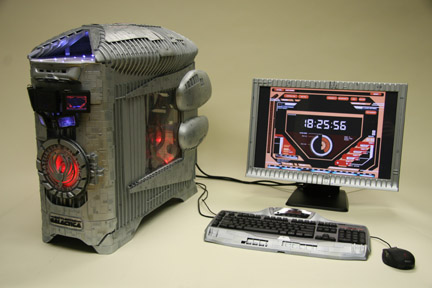‘Kustom’ computers to show at Exploratorium
By Liska Koenig
The Guardsman

Computers and cars might have more in common than you think.
The Exploratorium, San Francisco’s interactive museum of science, art and human perception, will demonstrate that connection in “Rods & Mods: the Kustom Kulture of Radical Computer Modification,” a three-day event held Feb. 11 – 13.
“My boss had read Tom Wolfe’s classic book ‘Kandy-Kolored Tangerine-Flake Streamline Baby’ about custom car culture, and when she talked with some computer modders she realized they talk just like the people in the book,” said Craig Anderson, public programs manager at the Exploratorium.
The museum will have about thirty desktop hot rods and restored classics on display, including some borrowed for the event from the Computer History Museum in Mountain View.
The upcoming exhibit will journey into the future of technology and delve into its past. “There will be demonstrations of the abacus, often seen as the ancient, original computer, to add historical context to the event,” Anderson said. Visitors will get the opportunity to build an abacus, which they can then keep.
Interested gamers will have the option of playing Pong, which is considered one of the first video arcade games.
The real stars though are the computers, customized by modders who will travel from as far as Southern California, Oregon and Florida to show their souped-up machines.
“This is a fun way to shed light on a niche community of tinkerers, scientists, artists and engineers,” said Alex Smith, public relations officer for the Exploratorium. The event is already creating excitement in modder circles. Most of these enthusiasts have only met online and “Rods & Mods” is an opportunity for them to finally meet in person.
The trend of amping-up computers for optimum performance and individualized looks originated within the hacker community about twenty years ago, according to an Exploratorium press release.
Some computers have been morphed from ordinary pieces of plastic into unique pieces of art, such as the work of Nick Falzone, a furniture maker by trade. Falzone, who goes by the modder name “Green Sabbath,” uses various materials to give his cases the look of classic Asian cabinets illuminated with glowing blue lights.
Other show pieces demonstrate the need for speed, with multiple processors equipped with liquid cooling systems, powerful enough to simultaneously run games with detailed graphics while downloading internet content.
“It gives people an advantage at gaming conventions because you can intimidate your opponents with your cool looking computer,” Anderson said.
Visitors are encouraged to bring their own laptops, cellular phones or any other small gadgets and modify them on-site with the expert help of seasoned computer tinkerers and engineers.
“For a very reasonable fee, museum visitors can get their laptops pin-striped,” Smith said.
Staff in the Exploratorium’s Playful-Inventive-Exploration department will show visitors how to make their own vinyl-cut designs. These designs will then be cut out by the museum’s vinyl cutter for the artist to apply to their own computers or cell phones.
“Rods & Mods” takes place Feb. 11 – 13, noon – 5 p.m. at the Exploratorium, 3601 Lyon Street, San Francisco, phone 415-397-5673. The event is included in the price of admission. All talks and demonstrations are free. Previous registration is not required.
